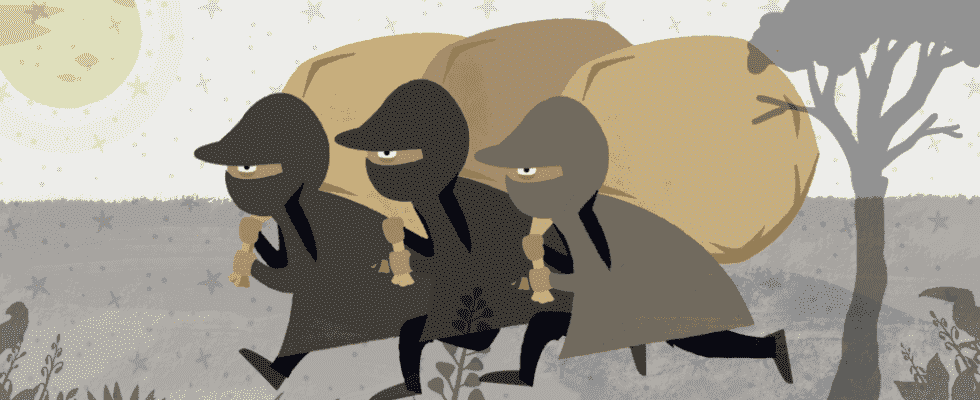We have a saying that you always reap what you sow.
The story I am going to tell you is a story that was told to me by my father, who received it from my grandfather, who in turn received it from father, father, father, of his grandfather’s father.
Formerly, in a village, lived Zemsitaba, Noubila, Rahitaba, three young sloths. They were always together, wandering around the village.
One day, the eldest named Zemsitaba said to the other two:
ZEMSITABA: “Friends, in a few years, we will grow old, and we must plan our future by looking for a job that will allow us to earn our money quickly. »
Each of them had to think about finding this profession. Given their nature, they chose flight. No sooner said than done, they embarked on the theft of red sorghum and millet which are used to produce tchapalo, an intoxicating drink made from these cereals.
Zemsitaba advised them first of all to consult the greatest marabout of the region so that he gives them a magic potion. This potion was to make them invisible each time they committed their crime. By applying it they intoned this song:
ZNR on the head
ZNR on the window
ZNR on the feet.
So was it done! They held their magic potion and each time they went flying, they applied it to their body repeating their magic formula.
On the first day, they went to one of the villages, when the villagers were already in their fields.
The three friends began to repeat their formula.
ZNR on the head
ZNR on the window
ZNR on the feet.
They succeeded in their first attempt by carrying a hundred very full bags which they sold in three days. For two good years, the three friends prospered.
Then, one fine day, they decided to aim higher by stealing oxen. So they went at night to a farm where there were several oxen in a pen. As the saying goes, “a thousand days for the thief but only one day for the owner”.
Our three thieves, very sure of themselves, didn’t even bother to coat themselves with their magic potion. Arrived on the scene, Zemsitaba asked the youngest, that is to say Rahitaba, to feel the oxen. When she put her hand through the hole in the fence, the owner, great marabout before the Eternal, made her hand disappear. The unfortunate woman withdrew her arm, without shouting her astonishment, then hid it under her coat, saying to Zemsitaba and Noubila:
RAHITABA: “Ah yes! The beef I touched is very fatty. Pass your hand by yourselves and see. »
It was Noubila’s turn. Great was his surprise when he saw his hand disappear. He called Zemsitaba saying:
NOUBILA: “My friend, what he said is true, that beef is very fat, put your hand up, you’ll see. »
Zemsitaba, enthused by the words of his friends, did the same. Then, noting the disappearance of his hand:
ZEMSITABA: “You are mean, you couldn’t tell me it was a marabout’s beef? »
Mocking him, Rahitaba and Noubila replied:
RAHITABA: “Ah! It’s the rule though, you said we had to share equally whatever we got. »
NOUBILA: “That’s why we wanted to share the fruits of our labor with you. Now we are all on the same level. »
From that day Zemsitaba, Rahitaba and Noubila decided to stop the flight.
In life, it is good to work honestly to earn your bread, because we always reap what we sow!
Africa in story is a series created by the NGO Des Livres Pour Tous – Côte d’Ivoire and the collective Making Waves, in partnership with RFI. This project has received support from the “Access Culture” scheme of the French Institute in Paris and the French Development Agency (AFD), the “ACP-EU Culture for West Africa – Awa” program from the French Institute and the Kôrè Cultural Centre, the “Agir” system of the Department of Seine-Saint-Denis and the Île-de-France Region.
Subscribe to the “Africa in Tales” podcast
Africa in story is available to listen to on all podcast platforms: Apple Podcasts, Spotify, Deezer, Podcast Addict, Castbox, Google Podcasts or any other application using the RSS feed.
